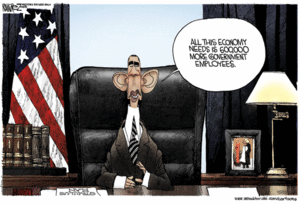OPERATION OBAMA
The "American Recovery and Reinvestment Plan".
The very name captures the lofty expectations that Barack Obama brings with him to the White House.

But will this plan meet these lofty expectations ?
Let's try to analyse it objectively to answer this question without any bias...
First, what does the plan consist in and how much is it going to cost ?
* AIM ?
Obama’s “American Recovery and Reinvestment Plan” aims to “create or save” three million jobs by 2011 and would include public works projects and support for states that are struggling to balance their budgets.

* HOW ?
The plan mainly includes tax cuts for lower and middle income groups and relief for businesses over two years.
A lot of money will flow to states, highways and health care projects.
So, as the name of the of the plan implies, all that cash will nurse the economy to recovery.
* COST ?
If adopted by Congress, the complete recovery package :
- would cost between $750 billion and $1 trillion :
According to the Congressional Research Service, this would exceed the cost of the Vietnam War, which drained the treasury of $682 billion in current dollars,
- It would more than double the savings tax payers received in George W Bush’s tax reforms of 2001 and 2003.
“It's clear that we have to act and we have to act now to address this crisis and break the momentum of the recession or the next few years could be dramatically worse,” Mr. Obama told reporters yesterday as he prepared to meet congressional leaders to push his plan. “We've got to act boldly, and we've got to act swiftly.”

But beyond the "bold" and hopeful rhetoric, crucial questions remain unanswered.
And a lot of economic experts have already judged the plan inefficient, not to say dangerous.
Will the stimulus plan be large enough to have an impact? And if it's large enough to move the world's largest economy, can American taxpayers afford the price without condemning future generations to financial ruin?
With the stimulus package, the U.S. budget deficit is expected to soar to a record of more than $1-trillion this year, up from $455-billion in 2008. That would represent 7 per cent of GDP, or the largest shortfall since the Second World War. Some economists are forecasting an even larger deficit of $1.3-trillion, or 9 per cent of GDP.
So the price to pay is a heavy reliance on private investors, many of them foreign. Over time, rising public debt levels are likely to push down the value of the U.S. dollar and push up U.S. interest rates. Both consequences would feed inflation and lower everyone's standard of living.
The longer-term consequences may be even harder to swallow. As Mr. Levy puts it: “The U.S. will need to produce more and consume less.”
Boston-based economist Rebecca Wilder argued that spending billions of dollars on construction projects will do little to enhance productivity. The money would be better spent investing in manufacturing and exports, she said.
“If long-term growth is the name of the game, why focus on inefficient domestic construction efforts?” Ms. Wilder asked.
Bank of America's Mr. Levy similarly worried that a chunk of the stimulus money will either come too late or go to wasteful and inefficient pork projects. “Historically, most fiscal stimulus packages have been late, costly and loaded with unnecessary government spending,” he said.
To conclude, I'm not sure that this massive "Operation Obama" to save the American economy is going to be very efficient...

And American people might soon discover with bitterness that their new president has no particular qualification to manage the economy of their country !
